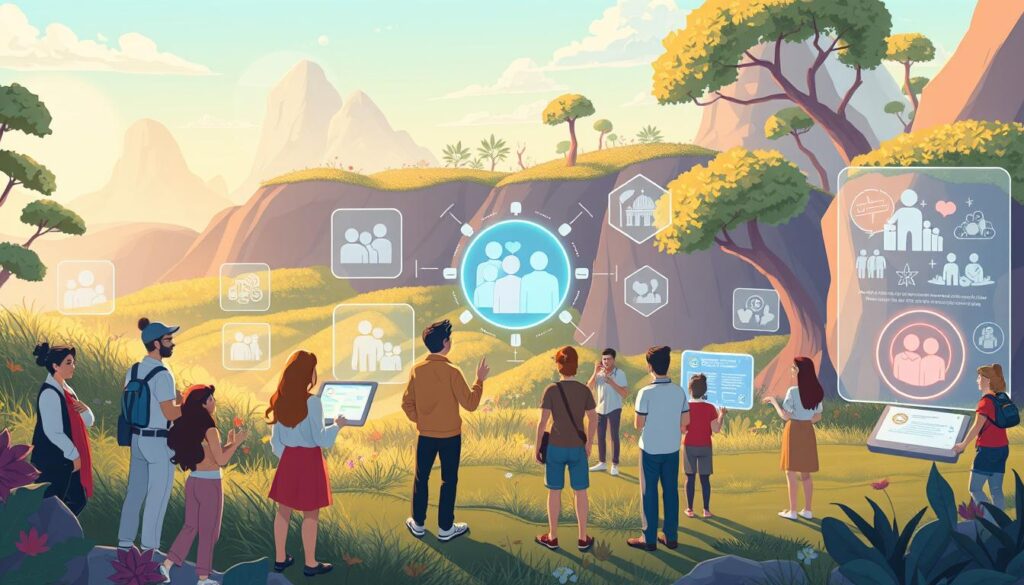There are over two million charities out there. This makes it hard for people to choose where to donate. But, artificial intelligence (AI) is changing this, offering new ways to help causes more effectively.
AI is helping nonprofits work better and measure their impact more accurately. It’s also leading to new solutions for big global problems. This shift in AI for social good is changing how we give and making a big difference in the nonprofit technology world.
The Rise of AI in the Nonprofit Sector
The nonprofit world is seeing a big jump in AI applications for nonprofits. Even though only 28% of nonprofits use AI now, 89% think it will make them more productive. AI-powered nonprofit tools are changing how nonprofits work, from better fundraising to smarter use of resources and community outreach.
Nonprofits using AI applications for nonprofits can make better decisions and use resources wisely. They can look at lots of data to find important trends and insights. AI-powered predictive analytics help find the right donors, which could lead to more donations. Groups like Fundraising.AI are using AI to help make a bigger difference in local and global issues.
Overcoming Barriers to AI Adoption
Even with AI’s great promise, barriers to AI adoption in the nonprofit sector remain. Not knowing how to use AI, not having enough money, and training staff are big hurdles. It’s important to teach, fund, and work together to overcome these challenges.
As nonprofits grow, using AI applications for nonprofits can open up new ways to work better, connect with donors, and make a real difference. By using AI-powered nonprofit tools, nonprofits can work more efficiently, focus on important tasks, and make a big impact in the communities they help.
AI in Philanthropy: Transforming How We Support Causes
There are so many charities out there, it can be hard to choose where to donate. AI is changing this by providing tools like ImpactMatch that can analyze a donor’s interests and values to recommend the best charities specifically for them. This helps donors give in a way that truly makes a difference.
AI is also making it easier to see how charities spend their money. This AI-powered transparency lets donors make better choices. It encourages them to support causes they really care about.
From Reactive to Proactive Giving
A report by Tech Impact shows that over 90% of nonprofits think AI is key to their success. AI-driven CRM systems have resulted in a 29% increase in donor retention rates for charities, as reported by the Nonprofit Technology Network. Charities using AI for personalized charity recommendations have seen a 32% increase in donations, according to a study by Blackbaud Institute.
Transparency and Impact Measurement
IBM Watson Analytics has helped charities raise more money by 40% through predictive analytics and data visualization capabilities. Organizations like Charity: Water have cut maintenance costs by 25% with AI. AI-based fraud detection tools have helped charities reduce fraudulent activities by 70% and increase donor trust, as per a study by Charity Navigator.

The Red Cross has made disaster response 45% more efficient with AI. Nonprofits are focusing on more transactional interactions due to reduced resources, understaffing, and economic uncertainties. But AI can help nonprofits build and nurture relationships at scale without needing more resources.
Innovative AI Solutions Addressing Global Issues
The nonprofit sector is using AI for social impact to tackle big challenges. They’re finding new ways to help in healthcare, education, and the environment. AI-powered solutions for global challenges are changing how nonprofits work on tough problems.
Jacaranda Health is using AI to improve care for moms and babies in Africa. The Rocket Learning Foundation is creating digital spaces for early learning in India. They’re using AI to help kids in low-income areas.

These examples show how AI in the nonprofit sector can make a big difference. AI helps nonprofits solve big problems, work better, and make a real impact.
Ethical Considerations and Inclusive AI Development
The philanthropic sector is exploring the use of artificial intelligence (AI). However, it faces ethical challenges like algorithmic bias, privacy issues, and lack of transparency. These concerns are shared by many, with 54% of Americans feeling cautious and 49% concerned about AI’s impact.
To make AI in philanthropy fair and inclusive, ethical AI in philanthropy and inclusive AI development are key. By tackling bias in AI and promoting fairness, the sector can use AI’s power while avoiding its risks.
Addressing Bias and Promoting Equitable AI
Bias in AI is a big problem, with up to 38.6% of AI “facts” being biased. To fix this, groups like the Partnership on AI (PAI) are focusing on including diverse voices in AI development. They aim to create AI that is fair and open to everyone.
Conclusion
AI is changing the game in philanthropy, making giving more efficient and effective. It helps donors make better choices and supports nonprofits in new ways. This tech is key to solving big social and environmental problems.
But, we must use AI wisely to avoid risks and ensure fairness. Philanthropy is crucial in using AI for good and fighting inequality. As AI grows, nonprofits must use these tools to improve fundraising and engage donors.
The future of AI in giving is bright, with personalized help and automated tasks. AI can make nonprofits more efficient and connect them with supporters. By embracing AI, we can make a bigger difference in the causes we care about.
Legal Disclaimer for AIover40.com
Welcome to AIover40.com. Please note that the information provided on our blog, including comments and insights, is intended for informational and entertainment purposes only. This blog is not a source of professional advice.
No Professional Advice
The content shared on this blog is designed to provide helpful information on the topics discussed. However, this blog does not provide professional advice and should not be used as a substitute for advice from a certified professional in the fields of artificial intelligence, finance, healthcare, or any other professional domain. The use of any information provided on this blog is solely at your own risk.
Accuracy and Completeness
While we strive to keep the information up to date and correct, we make no representations or warranties of any kind, express or implied, about the completeness, accuracy, reliability, suitability, or availability of the website or the information, products, services, or related graphics found on the website for any purpose.
Limitation of Liability
In no event will AIover40.com, its affiliates or its representatives be liable for any loss or damage including without limitation, indirect or consequential loss or damage, or any loss or damage whatsoever arising from loss of data or profits arising out of, or in connection with, the use of this blog.
Consent
By using our blog, you hereby consent to our disclaimer and agree to its terms.
